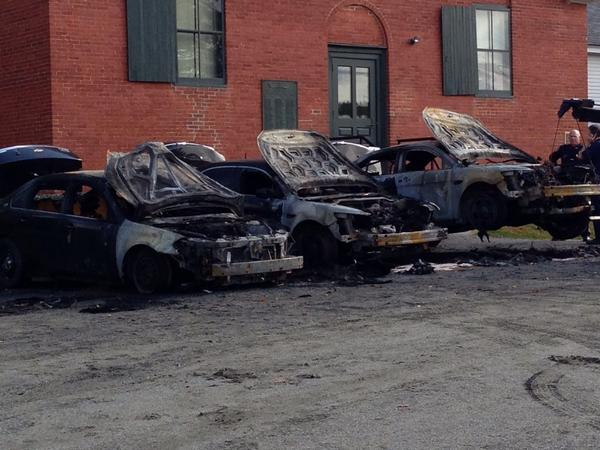How did Thetford end up with a big-city police union? A brief history
Should the police union have more power than the Selectboard or the taxpayers the Selectboard represents?

Editor's Note: Nick is a current Selectboard member and served as Selectboard Chair from January 2020 to March 2021.
The Town of Thetford, led by the Town Manager, has been negotiating a new contract for local police officers with their professional union, the New England Police Benevolent Association (NEPBA), since late 2020. The outcome will determine working conditions and how much of the municipal budget gets spent on law enforcement. Inversely, this will also influence which other spending areas receive less money and the Selectboard's ability to mitigate tax rate increases.
These negotiations shape the kinds of budgetary decisions the Selectboard can make about how to use taxpayer dollars. Considering the power of the police union, how much control does the Selectboard, and the residents it represents, have over its own budget?
The Selectboard recently solicited feedback for its 2021 Annual Retreat, an opportunity for elected representatives to check in with residents. Of the responses, three addressed police reform.
Move funding from the police department to social services which prevent and aid those people who are experiencing episodes that police are unnecessarily called to.
Reallocate police money for mental health, housing, food insecurity, gun safety measures.
Set up a program similar to Hartford PD Special Needs Support Center.
But would such a proposal be that easy to implement?
The short answer is no. Almost everything that touches our police force has to be negotiated with the union and the NEPBA has repeatedly supported positions that increase spending. The two Thetford officers are members of the union, which is based out of Boston. As of 2009, the latest data point available, NEPBA had 4,000 dues-paying members. Quoting from the NEPBA website, “Our representatives and legal staff are uniquely qualified to assist your organization with any labor related matter or with any legal issue involving any job related action, while in the performance of your duties.”
Unions were originally created to protect workers against exploitation by corporations. A small town like Thetford (population ~2,550) is hardly comparable to a corporation, financially or in its legal might. Our small tax base makes it virtually impossible for the Town to have multiple top priorities, such as policing and infrastructure, or to engage in prolonged legal battles.
How did our small town end up with a big-city union?
Some answers can be found in Selectboard meeting minutes from 2013, which is when the local chapter of the union was formed. On January 7, 2013, the Selectboard acknowledged receipt of a letter: "The Thetford Officers have been officially assigned as members of the NEPBA Local 403 and have asked to begin contract negotiations.” Present at that meeting as a member of the public was Stuart Rogers Sr., the father of Officer Stuart Rogers, Jr.
Rogers Sr. went on to run for Selectboard, and was elected in March of 2013. According to Town records, Rogers Sr. involved himself in the union negotiation, proffering changes to the union negotiation proposal, raising serious concerns from Selectboard Chair Donn Downey and then Police Chief Lanctot. Chief Lanctot went as far as to bring his personal attorney to a Selectboard meeting; the attorney suggested that Rogers Sr. could be stripped of his sovereign immunity if he acted in a way that benefited a family member.
Minutes from May 6, 2013 read: “Once ratified, the contract will change officer pay structure and other aspects of the Police Department’s budget, thus deviating from the budget voted on during Town Meeting. Because the financial requirements of the Department will change significantly from the approved budget, the Selectboard must hold a Special Town Meeting.” `
After seconding the motion to ratify the contact, Rogers Sr. ultimately recused himself from the vote; the Town's attorney had provided advice regarding the conflict of interest in respect to the position of Rogers Sr. on the Selectboard and his son’s position in the police department and suggested that Rogers Sr. recuse himself from any Selectboard matters dealing with the police.
On June 24, 2013, a Special Town Meeting asked voters to raise an additional $35,000 to cover expenses relating to the police union contract from June 1 to December 31st of 2013. In July, an additional budget shortfall of $17,000 was noted, "resulting from new requirements related to the unionization of the police officers."
Following the ratification of the union contract, a series of events occured regarding the Town's police cruisers. Readers may not be aware of this bit of Town history. On July 15, 2013, Chief Lanctot proposed a change in the number of cruisers:
Lanctot and the Selectboard discussed how many police cruisers the Town would need to fund now that the Town’s officers are under union contract. Prior to the unionization, officers took their cruisers home at night in order to respond to after hour call outs. Under the new contract, officers will not respond to call outs. This negates the need to take the cruisers home. Furthermore, the Town can reduce its number of cruisers because the union officer rotation has only one officer on duty at a time. The Town therefore only needs one cruiser for its officers and one for its Police Chief. Lanctot stated that operationally the Department can function well with only two patrol units. The Selectboard agreed to notify the Police Union of this policy.
This led to a series of union grievances and Unfair Labor Practice claims over the next year, however the ratified union contract was silent on the issue of cruisers being taken home. The Town, following binding arbitration, was able to rescind the benefit, potentially leading to some substantial cost savings. Then Treasurer Jill Graft estimated that the legal fees related to cruiser issues, however, had cost the Town $15,000 in 2014.
On October 17th, 2014, Thetford’s police cruisers were set ablaze. The Selectboard flipped its position: members deemed that the cruisers were not safe unless they were taken home. While an investigation by the State Police officially identified the fires as incendiary arson and linked them to cruiser fires two years earlier in Norwich, no one was ever charged.

Both fires in Thetford and Norwich caused an estimated $100,000 in damage, and both happened around 2:30am. “… if you ask me, it's too big a coincidence,” Thetford interim Police Chief Robinson said, referring to the similiarity of the destructive events.
Selectboard minutes from October 22, 2014 show that the surveillance camera at Thetford's Town Hall had no film of the fire.
Regardless of who set the fires, it seems clear that the union benefited from the impact the fires had on the Selectboard and their position regarding taking cruisers home.
During the next round of negotiations in 2017-18 over the renewal of the police contract the union presented the Town with new language that deviated from what had already been negotiated. This forced the negotiations into yet another required and expensive arbitration phase. A similar scenario is being repeated in the 2020-21 contract renewal negotiation, tone deaf to the voter approved 2021 budget.
In 2013, Selectboard Chair Donn Downey led initial contract negotiations in open session to the objection of the union. Residents sat in as benefits and coverage were discussed publicly for that first-ever contract. Open conversations like these could give residents more understanding of and input towards their local municipal budget today – the public could act as a check on negotiations. As Downey said in 2013, it's "the Selectboard's desire to honor the spirit of the Vermont open meeting law as a policy."
